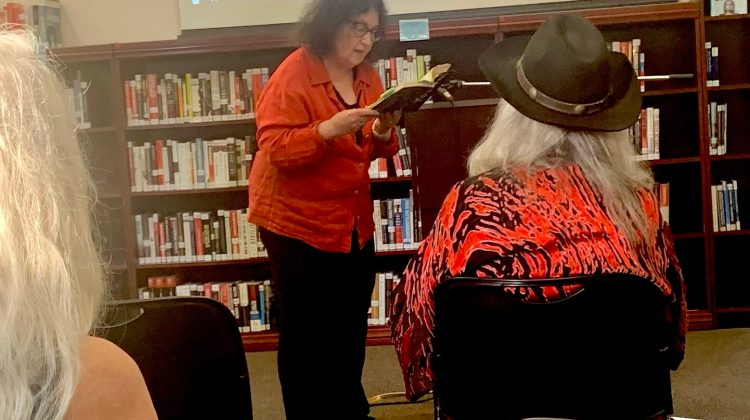LYNN — Members of the Gloucester Writers Center and the city’s community read verses from acclaimed poet Vincent Ferrini’s long bibliography and laughed along to memories of his life at the Lynn Public Library.
Ferrini, who died in 2007 at the age of 94, published 31 volumes of poetry over the course of his career. He began his journey at the library.
Henry Ferrini, Vincent Ferrini’s nephew who documented his uncle’s life in the film “A Poem in Action,” shared how Vincent Ferrini’s poetic talent went unrecognized by his English teachers in high school.
“His real education, his real degree, was from this place. I’m glad we’re all here,” Henry Ferrini said.
He said Vincent Ferrini, shaggy-haired and poor, would bring a black bag to the library and fill it up with Shakespeare and Socrates, “accumulating a library of his own.” Then, after two years of guilt, he returned all of the books he had collected.
“Read his poems and we read his history of our time. Our anxieties of grinding poverty, industrial America, immigrants in America, depression in America, up through the age which follows the economic boom after World War II,” Henry Ferrini said, referencing a review of Vincent Ferrini’s work.
The reading was hosted by the Gloucester Writers Center, which is based at Vincent Ferrini’s old home in Gloucester. The center hosts year-round programs, including open mics, workshops, and writing groups, and helps fund scholarships for young writers.
Eric Parkison, program director for the GWC, said he hopes the reading highlighted the fact that there are many successful writers and artists who were born and educated in Lynn.
“Vincent was a very publicly minded person. I think it’s a testament to the idea that poetry can have power in people’s lives,” Parkison said. “The people who are touched by poetry are not some kind of exclusive or separate class. It is everybody.”
Parkison kicked off the program, reading from a poem Vincent Ferrini wrote about the shoe workers’ union losing a contract battle in Lynn, describing the city as a “graveyard of factories.”
“Six months ago, the last giant factory accepted a 20% cut. The union answered no. The boss grabbed his shot and settled out of a state, leaving 1,700 families stranded. The union caved in,” Parkison read.
Second to the podium was Carl Carlsen, professor emeritus at North Shore Community College and author of “Brickyard Stories: A Neighborhood and its Traditions” and “Brickyard Stories 2.0”
Carlsen said Vincent Ferrini’s family was from a second wave of predominantly Irish and Jewish immigrants who lived in the Brickyard neighborhood, which was a “roughly a half-mile square” between Pleasant Street and Commercial Street. Carlsen added that the neighborhood has since changed due to urban renewal.
“I think the Brickyard is where immigrants came to begin to climb the ladder of success and to pursue the American Dream,” he said.
Carlsen said that after bringing Vincent Ferrini to meet the faculty and students in the electrical workers unit at North Shore Community College, he was inspired to undertake an oral-history project that led to his two volumes of “Brickyard Stories.”
He added that Vincent Ferrini had a special connection to NSCC and its faculty and that there are tapes of him reading his poetry at the college at the Boston Public Library.
Carlsen also read one of Vincent Ferrini’s poems expressing distress regarding the future in an unstable economy and political environment.
“Always gawking at the morning headlines, for him, each day is the preparation for his grave in a foreign country. So I worry about the future. So his job is to sit on thin ice, though his job is to sit on thin ice on which he skates most of the time,” he read.
Elizabeth McKim, known as “the jazz poet of Lynn,” shared some of the poems Vincent Ferrini had sent to her when they were lovers.
She said she has more than 100 “beautiful” letters from him, all of which contain a visual aspect. He called her Elisabeta.
McKim read a poem Vincent Ferrini wrote for his daughter after her tooth fell out during December. The poem’s verses are shaped like a Christmas tree. In the poem, Vincent Ferrini describes a scenario in which elves take away Jesus.
“And then we will see if they miss him and that’s what I have been praying for. If they do, Christ will live every day and the adults will never grow old and die because we will all be in Fairy Land,” she read.
She also shared the story of how when she divorced her husband, she wanted to give her diamond ring away for a charitable purpose. She immediately thought to give it to Vincent Ferrini, who needed money to publish his book at the time.
McKim shared a story of a cat that broke free, climbed up a tree, and would not come down while she was staying with Vincent Ferrini, “a famous story in Gloucester at the time,” as a preface to another poem.
“The gold, the southern flowers have started with the air with their fire, and as we do with what is ours because we are gardeners of each other,” she read.

